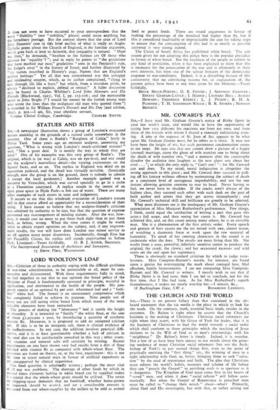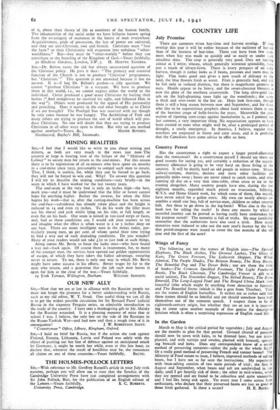THE CHURCH AND THE WORLD
SIR,—There is no greater fallacy than that contained in the oft- heard statement that the via media is the place in which to look for the truth. On the contrary, truth, essential basic truth, resides in the extremes. Dr. Relton is right when he asserts that the Church's business is the making of Christians. Christian social reformers are right when they assert, with his Grace of York for leader, that it is the business of Christians to lead the world towards a social order which shall conform to those principles which the teaching of Jesus declares to be the Will of God as to man's relationships with his neighbour." Dr. Relton's letter is timely. Indeed, it is overdue. Not a few of us have long been uneasy in our minds about the grow- ing tendency of many Christian social reformers (but not the Arch- bishop of York!) to put second things first, even to the point of practically omitting the " first thing," viz., the winning of men to a right relationship with God, or, better, bringing them to seek " salva- tion " by the road of repentance and faith. The plea that Christians must reform the world's habits, manners and scheme of life before they can " preach the Gospel " to perishing souls is as specious as it is dangerous. The Kingdom of God must come first in the hearts of " saved " men, and when it does " social reform " will follow auto- matically. But when the Gospel of Repentance is preached men must be called to " change their minds " about—what? Primarily, about God and His sovereignty, but with that, or rather arising out
of it, about their theory bf life as members of the human family. The inhumanities of the social order we have hitherto known spring from the sovereignty of mammon in the hearts of men everywhere. Acquisitiveness, pride of possession, the lust of power are universal, and they are anti-Christian, root and branch. Christians must " face the facts' or their Christianity will evaporate into nebulous " other- worldliness." But—they must be " other-worldly " before they can contribute to the founding of the Kingdom of God.—Yours faithfully, 5A Gledhow Gardens, London, S.W. 5. H. MARTYN SANDERS. SIR,—Dr. Relton raises the old but always unanswered question of the Christian policy. He puts it thus: " The primary and essential function of the Church is not to produce ' Christian ' programmes, but ' Christians.."' This question is not answered because it has no answer. It is—I beg Dr. Relton's pardon—a silly question. We cannot " produce Christians " in a vacuum. We have to produce them in this world, i.e., we cannot neglect either the world or the individual. Christ produced a good many Christians by healing their bodies (" And straightway he received his sight, and followed Him in the way "). Others were produced by the appeal of His personality and preaching. Does it matter in the end what brought us to Christ if we are brought? The Prodigal Son was received with joy though he only came because he was hungry. The Archbishop of York and many others are trying to produce the sort of world which will pro- duce Christians. No one will doubt that they are trying to produce Christians in all other ways open to them. But why set one method against another?—Yours, &c., • MAUDE ROYDEN. Nestlewood, Bayley's Hill, Sevenoaks.


























 Previous page
Previous page